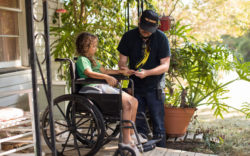The stories and personalities behind the Morton Theatre building are coming back to life. Just don’t be surprised if some of the stories aren’t quite what you thought.
A much-anticipated documentary about the historic center of Athens’ African American community will be the featured presentation during the annual meeting of the Morton Theatre Co. board of directors, which meets at 5:30 p.m. Tuesday, May 19 to introduce its new members. Following a short agenda—Morton Facilities Supervisor and Managing Director Lynn Green says it should take about 15 minutes — the board will screen the The Soul of Athens, directed by local filmmaker Keith Plummer.
The 27-minute documentary digs into the history of the building, which was built by Monroe “Pink” Bowers Morton in 1910. Morton, the son of a white man and an African-American woman, rose to prominence among contractors and builders in Georgia, and also built and owned several buildings in Athens. At one point, the Morton was much more than a theater—it was a thriving business center, serving as a hub for commerce and culture within Athens’ black community.
Plummer says that while the documentary focuses on the building, it’s the early uses of the structure that give it its personality and stories. Although there has been some history written about the Morton, he says, this is the first in-depth film about it. And as a result, Plummer says he often found himself piecing together stories and discovering that they sometimes weren’t exactly as they seemed.
“One of the things I found is, some things are lore and some things are true,” he says. “Like any documentary, you have to do some digging. A lot of the documentaries I do are on African-American topics, and there’s not a lot of footage or information on them.”
For example, while he had anecdotal evidence of performers who passed through the Morton, and at one point there were stories about them in one of Athens’ black-owned newspapers, those stories are long gone. But one scoop Plummer was able to secure was an on-camera interview with Morton’s grandson, who now lives in Reno, NV but recalled spending time in the theater as a child. Green adds that she was giddy with excitement when she also had the chance to meet him, and spent most of a day following him around as he gave her his own tour of the Morton.
Unfortunately, Plummer adds, a box of photos and memorabilia of the Morton family, which was passed from generation to generation, has been lost. And while he’s heard stories of taped interviews with Morton that are archived by the city, nobody has been able to locate them.
So instead, Plummer fills in the background of the building with stories from prominent Athenians, such as mayors Nancy Denson, Gwen O’Looney and Doc Eldridge, and others who served during the time the Morton was renovated and put back into use in the early 1990s.
“The building became where all the black professionals went, so I listed the people who are famous who came out of the building—at least, famous in Georgia,” says Plummer. “And then there’s the theater, and it had vaudeville shows and different kinds of shows, and then there was a fire and it was shut down. Then, the building went through its dilapidated period, and then there were people getting behind it to revive the building.”
Following a large SPLOST-funded reconstruction, the theater has since gone through another effort to bring the interior back to its original glory days, complete with historically accurate paint and decor, Green says. Having the documentary, she says, is like the icing on the cake. Along with the showing on the 19th, which is open to the public, the film will be shown again during the annual Hot Corner Festival. That screening is planned for 11 a.m. June 13.
“We’re just excited the board was able to get the film done,” she says. “We’re happy to move forward with this project and finally able to see it.”
The film, despite the difficulties in finding source material, is something the entire community can get behind, Plummer says. “I believe it’s a piece that people from Athens will learn from, and they will be proud of.”
Like what you just read? Support Flagpole by making a donation today. Every dollar you give helps fund our ongoing mission to provide Athens with quality, independent journalism.










